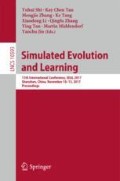Abstract
Sequential learnable evolutionary algorithm (SLEA) provides an algorithm selection framework for solving the black box continuous design optimization problems. An algorithm pool consists of set of established algorithms. A knowledge base is trained offline. SLEA uses the algorithm-problem features to select the best algorithm from the algorithm pool. Given a problem, the default algorithm is run for the initial round. After that, an algorithm-problem feature is collected and used to map to the most similar problem in the knowledge base. Then the best algorithm for solving the problem is used in the second round. This process iterates until \( n \) rounds have been made. It is revealed that the algorithm-problem feature is a good problem identifier, thus SLEA performs well on the known problems that have been encountered. However, the performance on those unknown problems is limited if the knowledge base is biased. In this paper, we propose a modified SLEA, which performs the training process using a novel method. A relatively unbiased knowledge base is formed. Experimental results show that the modified SLEA maintains the performance of SLEA on solving the CEC 2013 test suite, while it performs better than SLEA on solving a set of randomly generated max-set of Gaussian test problems.
Access this chapter
Tax calculation will be finalised at checkout
Purchases are for personal use only
References
Roy, R., Hinduja, S., Teti, R.: Recent advances in engineering design optimisation: challenges and future trends. CIRP Ann. Technol. 57, 697–715 (2008)
Zhang, X., Zhang, X., Yuen, S.Y., Ho, S.L., Fu, W.N.: An improved artificial bee colony algorithm for optimal design of electromagnetic devices. IEEE Trans. Magn. 49, 4811–4816 (2013)
Zhang, X., Fong, K.F., Yuen, S.Y.: A novel artificial bee colony algorithm for HVAC optimization problems. HVAC R Res. 19, 715–731 (2013)
Fong, K.F., Lee, C.K., Chow, C.K., Yuen, S.Y.: Simulation-optimization of solar-thermal refrigeration systems for office use in subtropical Hong Kong. Energy 36, 6298–6307 (2011)
Fong, K.F., Yuen, S.Y., Chow, C.K., Leung, S.W.: Energy management and design of centralized air-conditioning systems through the non-revisiting strategy for heuristic optimization methods. Appl. Energy 87, 3494–3506 (2010)
Eiben, A.E., Smith, J.E.: Introduction to Evolutionary Computing, vol. 53. Springer, Heidelberg (2003)
Yuen, S.Y., Zhang, X., Lou, Y.: Sequential learnable evolutionary algorithm: a research program. In: IEEE International Conference on Systems, Man, and Cybernetics, SMC, pp. 2841–2848 (2015)
Wolpert, D.H., Macready, W.G.: No free lunch theorems for optimization. IEEE Trans. Evol. Comput. 1, 67–82 (1997)
Kotthoff, L.: Algorithm selection for combinatorial search problems: a survey. In: Bessiere, C., De Raedt, L., Kotthoff, L., Nijssen, S., O’Sullivan, B., Pedreschi, D. (eds.) Data Mining and Constraint Programming. LNCS, vol. 10101, pp. 149–190. Springer, Cham (2016). doi:10.1007/978-3-319-50137-6_7
Muñoz, M.A., Sun, Y., Kirley, M., Halgamuge, S.K.: Algorithm selection for black-box continuous optimization problems: a survey on methods and challenges. Inf. Sci. 317, 224–245 (2015)
Kerschke, P., Preuss, M., Wessing, S., Trautmann, H.: Low-budget exploratory landscape analysis on multiple peaks models. In: Genetic and Evolutionary Computation Conference, GECCO, pp. 229–236 (2016)
Karaboga, D., Basturk, B.: A powerful and efficient algorithm for numerical function optimization: artificial bee colony (ABC) algorithm. J. Glob. Optim. 39, 459–471 (2007)
Loshchilov, I.: CMA-ES with restarts for solving CEC 2013 benchmark problems. In: IEEE Congress on Evolutionary Computation, CEC, pp. 369–376 (2013)
Wang, Y., Cai, Z., Zhang, Q.: Differential evolution with composite trial vector generation strategies and control parameters. IEEE Trans. Evol. Comput. 15, 55–66 (2011)
Zambrano-Bigiarini, M., Clerc, M., Rojas, R.: Standard particle swarm optimisation 2011 at CEC-2013: a baseline for future PSO improvements. In: IEEE Congress on Evolutionary Computation, CEC, pp. 2337–2344 (2013)
Qin, A.K., Huang, V.L., Suganthan, P.N.: Differential evolution algorithm with strategy adaptation for global numerical optimization. IEEE Trans. Evol. Comput. 13, 398–417 (2009)
Liang, J.J., Qu, B.Y., Suganthan, P.N., Hernández-Díaz, A.G.: Problem definitions and evaluation criteria for the CEC 2013 special session on real-parameter optimization. Technical report 201212, Zhengzhou China; Singapore; CEC 2013 (2013)
Muñoz, M.A., Kirley, M.: ICARUS: Identification of complementary algorithms by uncovered sets. In: IEEE Congress of Evolutionary Computation, CEC, pp. 2427–2432 (2016)
Gallagher, M., Yuan, B.: A general-purpose tunable landscape generator. IEEE Trans. Evol. Comput. 10, 590–603 (2006)
Hemert, J.I.Van: Evolving combinatorial problem instances that are difficult to solve. Evol. Comput. 14, 433–462 (2006)
Langdon, W.B., Poli, R.: Evolving problems to learn about particle swarm optimisers and other search algorithms. IEEE Trans. Evol. Comput. 11, 561–578 (2007)
Storn, R., Price, K.: Differential evolution – a simple and efficient heuristic for global optimization over continuous spaces. J. Glob. Optim. 11, 341–359 (1997)
Acknowledgement
The work described in this paper was supported by a grant from the Research Grants Council of the Hong Kong Special Administrative Region, China [Project No. CityU 125313]. Yang Lou acknowledge the Institutional Postgraduate Studentship and the Institutional Research Tuition Grant from City University of Hong Kong.
Author information
Authors and Affiliations
Corresponding authors
Editor information
Editors and Affiliations
Rights and permissions
Copyright information
© 2017 Springer International Publishing AG
About this paper
Cite this paper
Lou, Y., Yuen, S.Y. (2017). A Sequential Learnable Evolutionary Algorithm with a Novel Knowledge Base Generation Method. In: Shi, Y., et al. Simulated Evolution and Learning. SEAL 2017. Lecture Notes in Computer Science(), vol 10593. Springer, Cham. https://doi.org/10.1007/978-3-319-68759-9_5
Download citation
DOI: https://doi.org/10.1007/978-3-319-68759-9_5
Published:
Publisher Name: Springer, Cham
Print ISBN: 978-3-319-68758-2
Online ISBN: 978-3-319-68759-9
eBook Packages: Computer ScienceComputer Science (R0)

